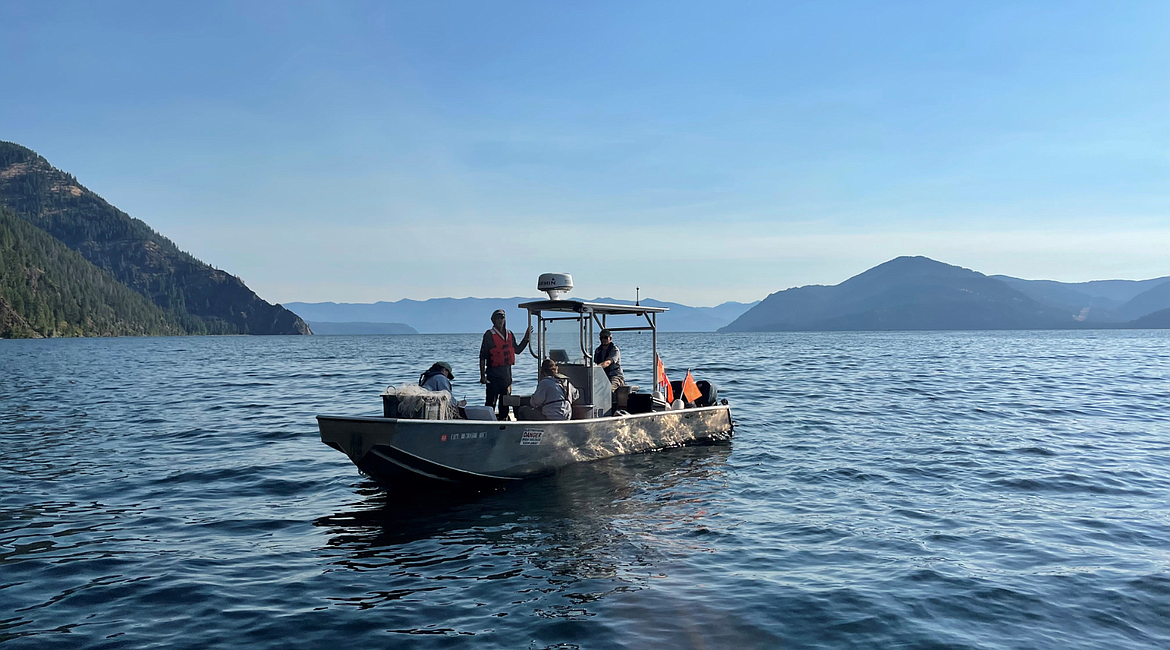Naval Station Everett supports local efforts on Lake Pend Oreille
The personnel of Naval Station Everett on Lake Pend Oreille are continuing their collaborative efforts to maintain and improve the lake’s health.
Responsible for managing natural resource programs at the Acoustic Research Detachment (ARD) in Bayview, Naval Station Everett is a Navy research facility on the shore of the Panhandle’s biggest lake.
Pend Oreille is a deep and quiet lake that is ideal to test the acoustic performance of large submarines and surface ship models. The lake also provides an effective underwater laboratory environment and a habitat for fish, particularly kokanee (land-locked sockeye salmon) and the Endangered Species Act-listed bull trout.
The Navy works with local partner agencies on multiple projects that help protect the natural environment, while enabling military training that supports national defense.
Last fall, the Idaho Department of Fish and Game partnered with the Navy to survey kokanee spawning areas on Navy shorelines. IDFG mapped spawning habitat and surveyed spawning activity along the lake shorelines using a remotely operated underwater vehicle and camera. Researchers gained a picture of where kokanee spawn and incubate their eggs, which is important because this species is the primary prey for bull trout and other fish.
After completing the survey, IDFG recommended ways to expand and improve fish habitat quality that included removing invasive aquatic weeds from the lake bottom where the kokanee need sediment-free gravel to spawn.
In addition to the kokanee spawning survey, the Navy is currently supporting IDFG on a two-year study of the bull trout’s relative abundance and fish community composition in the lake. IDFG is conducting gill net surveys seasonally throughout the study period at Navy facilities. When bull trout are caught, researchers attach tags that send signals to receivers that IDFG has placed around the lake to track fish movements. The Navy allowed receivers to be placed around the base shoreline, testing facilities, and buoys to help provide new data in that part of the lake.
“The Navy is lucky to have a great partner to collaborate with on bull trout and fish community research in Lake Pend Oreille,” said Alicia Higgs, Natural Resource Manager for Naval Station Everett. “We had questions and information that we were seeking for our Navy properties, and IDFG already had a wonderful lake-wide research effort underway. It made for a very natural, mutually beneficial partnership.”
As IDFG is expanding its work to cover Navy properties, Higgs said the Navy has provided more tags and new receiver locations that will benefit the research program as a whole.
Results from both kokanee and bull trout survey projects will be included in the Navy’s Integrated Natural Resources Management Plan to inform the Navy’s future conservation work on site and minimize potential disturbances to bull trout or kokanee spawning habitat.
The Navy has taken further action this year on spawning habitat restoration, in-line with IDFG’s recommendation to remove invasive aquatic weeds in the lake.
For several years, the Navy has collaborated with the Idaho State Department of Agriculture to track and remove invasive weeds, such as Eurasian watermilfoil and flowering rush.
This year, a Navy-contracted dive team removed an estimated 1,750 pounds of invasive plants that will help restore spawning habitat, as well as maintain lake conditions that support the Navy’s acoustic testing.
“We are very pleased to partner with the Idaho State Department of Agriculture because it has given us the expertise needed to combat the proliferation of invasive species in Lake Pend Oreille,” said Seth Lambrecht, director of ARD Bayview. “Our main focus is supporting the Navy’s acoustic superiority which relies on the lake underwater test environment and we also want to be good stewards to maintain it as a pristine natural resource.”
Kim Holzer, Agriculture Program Specialist with Idaho State Department of Agriculture, worked with Navy staff at Bayview on the invasive weed removal.
“The discovery of flowering rush inside the Navy’s property led our agency to conduct more detailed surveys in the southern part of Lake Pend Oreille around Farragut State Park, where we found more flowering rush and were able to initiate control early in the invasion process,“ said Holzer. “It’s incredibly rewarding to work with the Navy on invasive Eurasian watermilfoil and flowering rush control and have such positive outcomes.”

